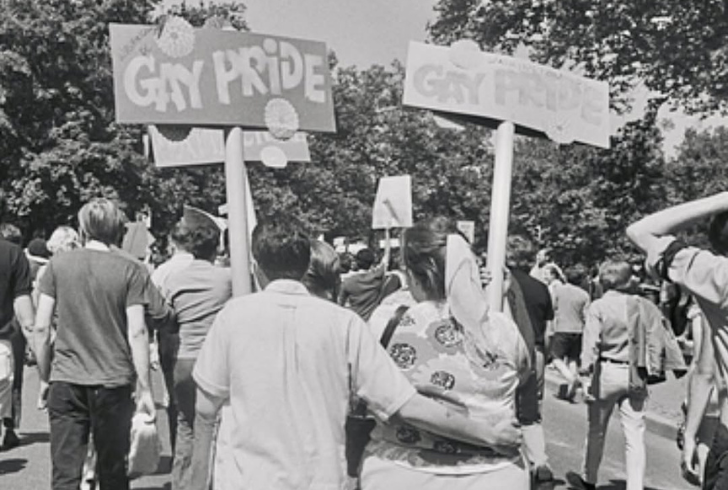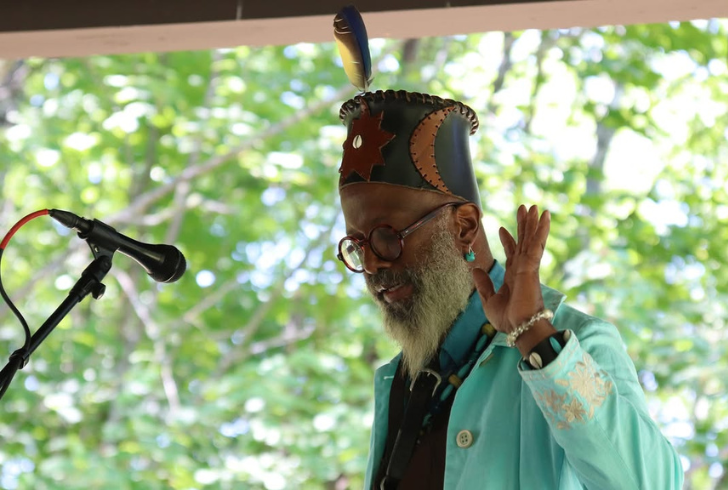“Being Gay Isn’t Weak” – 65 Year Old Toussaint St. Negritude Speaks Out
Toussaint St. Negritude doesn’t just walk into a room—he arrives with presence. His tall hats, vibrant scarves, circular glasses, and striking jewelry speak volumes before he even utters a word. However, it’s not just his style that sets him apart. It’s his voice—both poetic and musical. With a bass clarinet often slung over his shoulder, he merges jazz, spoken word, and deep emotion into a form of storytelling that commands attention.
His art, both seen and heard, carries more than sound—it carries his truth.
Speaking Life Into Survival
Toussaint stands as a symbol of unapologetic identity and fierce endurance. Coming of age as a Black queer man during the 1970s, he learned that survival was more than a condition—it was an act of protest.

Instagram | queerloveinhistory | Black Queer voices like Toussaint turn protest and survival into powerful living through love and art.
He explains this philosophy with powerful conviction:
“Survival for us has been thriving.”
This reflection breaks the modern tendency to draw a line between surviving and truly living. For Toussaint and others like him, staying visible, loud, and loving in a society that dismissed them was not only survival—it was brilliance in motion.
By making survival an act of creativity, Toussaint redefines resilience as something powerful and alive. Each poem, each note from his clarinet, becomes a celebration of that endurance.
Carrying Love in Every Space
Love remains at the heart of his artistic mission. Toussaint once said, “I’ve really had to kind of carry my love with me, like in my chest, constantly, just like a constant mantra.” That love isn’t just for the self—it radiates toward his community, his identity, and his ancestors.
His poetry often intertwines themes of intimacy, brotherhood, and unity, all rooted in the Black queer experience. In his spoken-word performance “Brothers and Brothers,” he repeats rhythmic lines about connection—brothers loving brothers, protecting one another, and breathing life into each other’s stories.
The poem grows like a heartbeat. Its repetitions aren’t just stylistic—they embody the pulse of a community that refuses to be erased. Through his words, Toussaint turns queer Black love into something eternal.
Art as Resistance and Reflection
Toussaint’s presence feels larger than life not just because of his fashion or musicality, but because of how he moves through the world. He shows that art can be both resistance and reflection. In a culture often defined by rapid trends and fleeting attention, he creates work that stops time.
He walks into performance spaces not just to entertain, but to witness and be witnessed. While others might reach for quiet or compromise, Toussaint opts for truth and flair. His creative process draws from both modern performance and ancestral memory.
He uses music as a form of spiritual grounding and poetry as a channel for lived experience. When he performs, the result feels less like a show and more like a sacred offering.
Language as Legacy
One of Toussaint’s most memorable traits is how he weaves his identity into language. Words, for him, are not just expressions—they are declarations. Each syllable honors the past while shaping the future.
His layered approach to writing mixes repetition with rhythm, evoking the power of oral traditions. In many ways, his poetic cadence mirrors that of jazz. There’s structure, yes, but also freedom—each line takes its own breath, makes its own beat.
By focusing on themes like community, love, survival, and identity, Toussaint creates work that resonates well beyond the performance space. His poetry invites listeners to feel, remember, and reconnect with what often gets silenced.
A Platform That Centers Black Queer Stories

Instagram | vthumanities | Toussaint shares Black Queer stories that bring love and joy into the spotlight.
Toussaint’s appearance in this deeply personal podcast episode allowed his voice to reach audiences who may have never seen performance poetry presented this way. It also centers a community too often pushed aside in conversations about both Black identity and queer visibility.
With each word, he speaks directly to those who carry similar stories in their bodies but may not yet have found the courage to voice them.
His reflection on visibility, especially as someone who lived through decades of systemic erasure, is more than insightful—it’s vital. In a time where identity politics often polarize, his poetry gently reminds us of humanity’s shared need for love, recognition, and joy.
Holding Space for the Future
The strength of Toussaint’s message lies in its gentle power. He does not preach or demand. Instead, he holds a mirror up to society while extending an invitation to look closer, to feel deeper, to love harder.
While it may seem that fashion, music, and poetry are separate disciplines, Toussaint threads them together with intention. He walks in all spaces as both artist and ancestor. His message stays clear: identity, when honored truthfully, becomes liberation.
So, whether he’s performing in a café or speaking in a podcast, Toussaint continues to carve space for stories that matter. And through his art, those stories breathe, sing, and endure.
Where Words and Sound Meet Power
From spoken poetry to jazz riffs, from declarations of love to reflections on survival—Toussaint St. Negritude reminds the world that Black queer identity is not a subculture or an aesthetic. It’s a living, breathing force.
And every performance—poetic or musical—is not just a moment. It’s a movement.